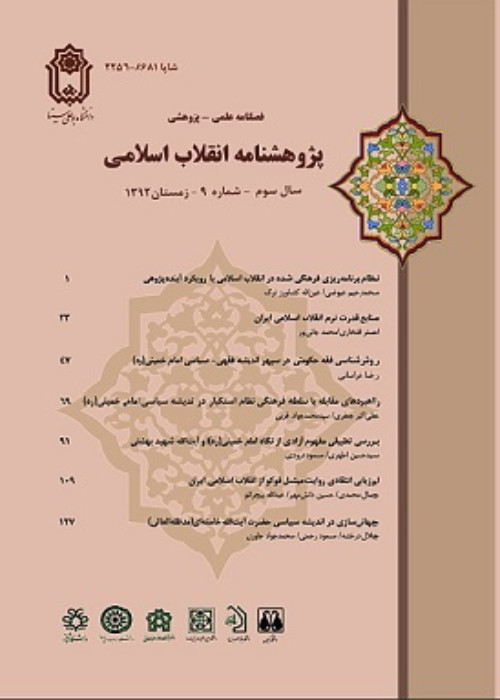Foundations and the consequences of tolerance in the political thought of Imam Khomeini
From Imam Khomeini's perspective, the effectiveness of the political system is an important issue. This is connected with the recognition of the rights and civil liberties. The present article investigates Imam Khomeini's theory of tolerance as a fundamental concept in order to achieve a solution in mutual acceptance of the civil and political system. Imam Khomeini is one of the pioneers among Muslim thinkers who have commented on the notion of tolerance, i.e. "Rfg"In Arabic language and its educational, ethical, social and political impacts in a chapter of his book entitled "The Explanation of Hadith about Soldiers of Wisdom and Ignorance". In this chapter, he explains about the necessity of tolerance in every community and its impacts on social and religious life and thoughts. He believes that not only character-centred violence has no impact on social and individual reform, but also it is the source of bigger and complex corruption. Moreover, further investigation of the notion of tolerance from his perspectives shows that tolerance is a para-dynamic concept. It is driven from religion and from the perspective of political ethics and political philosophy, which are an integral part of the religious rule and a principle of moral virtue and political rights. Therefore, tolerance, as social capital takes the educational, administrative, political, social and economic burden off the communities and strengthens positive moral and social rights. Along with distinctions, it makes peace possible and replaces the culture of peace with the culture of conflict. It is not a granted privilege but an outlook which is emanated from the recognition of the rights and civil liberties, and it takes place through practice, training, and acculturation in society.
- حق عضویت دریافتی صرف حمایت از نشریات عضو و نگهداری، تکمیل و توسعه مگیران میشود.
- پرداخت حق اشتراک و دانلود مقالات اجازه بازنشر آن در سایر رسانههای چاپی و دیجیتال را به کاربر نمیدهد.


